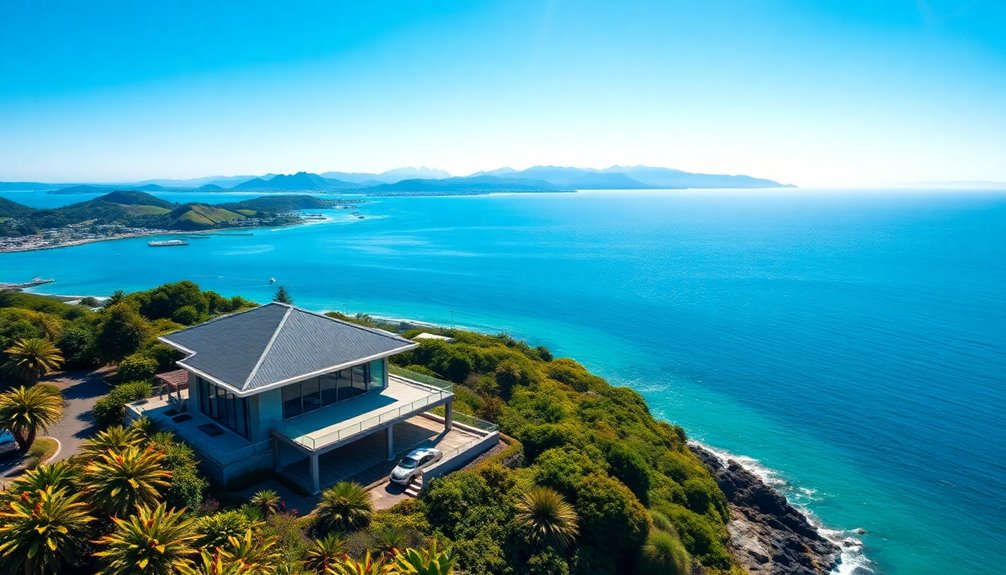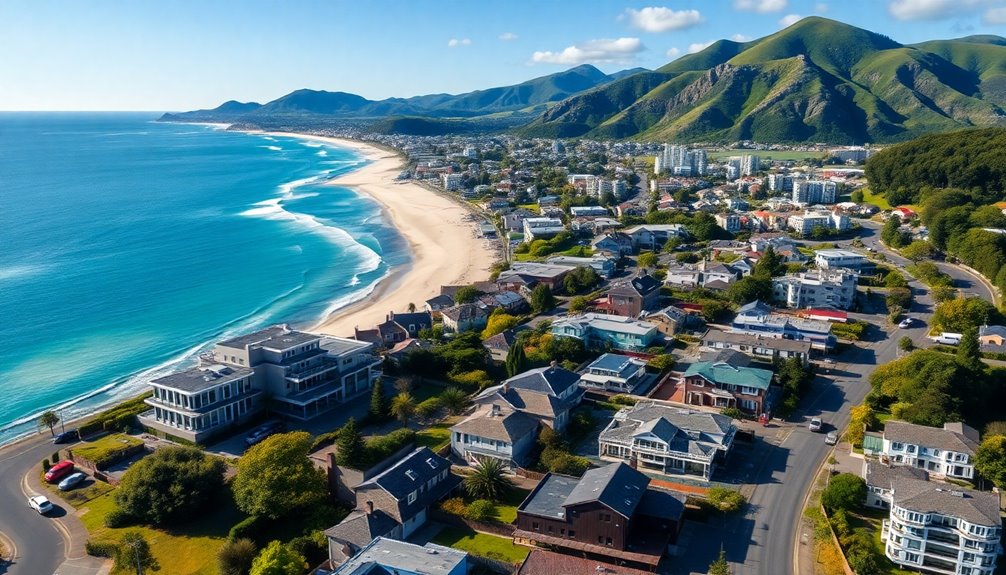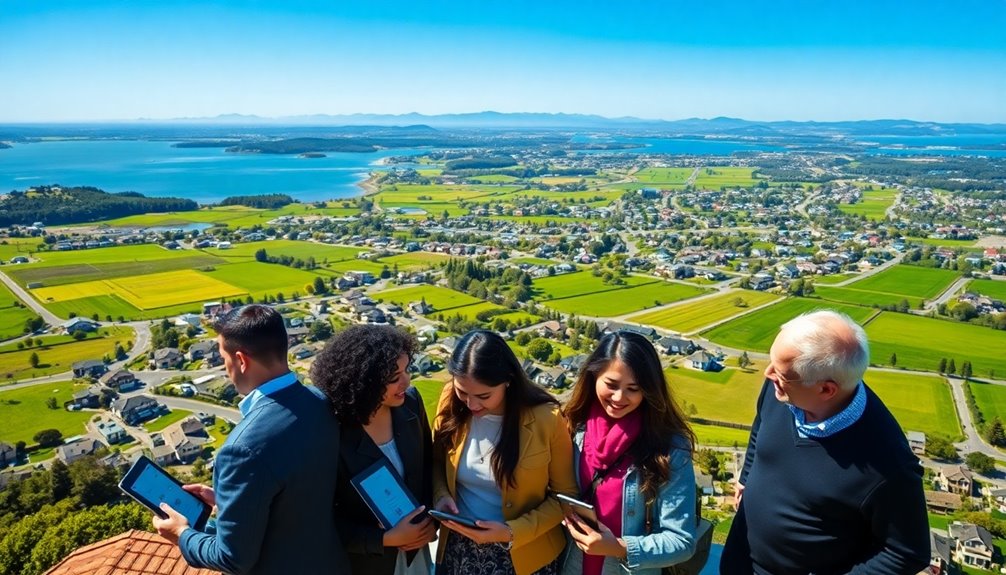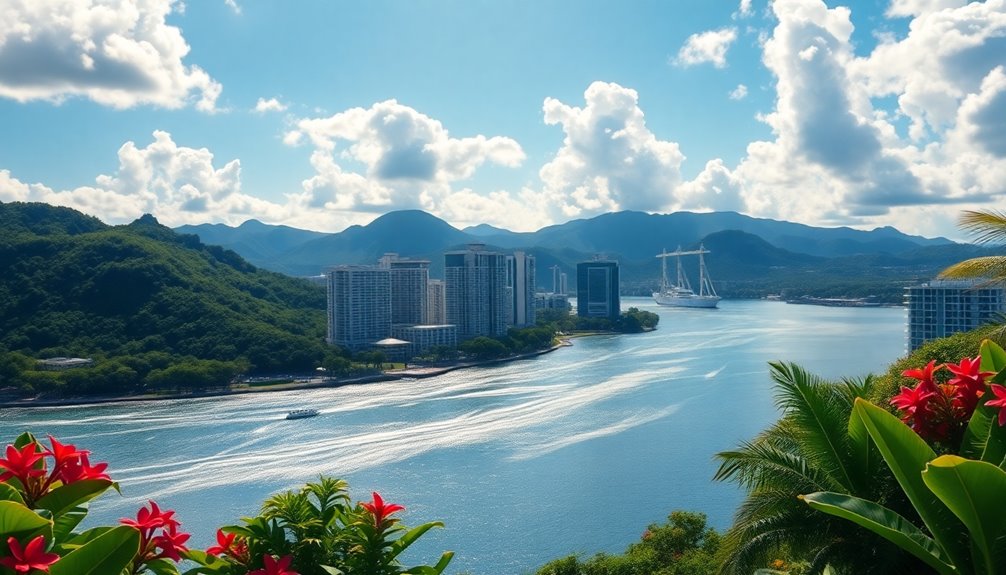If you're considering property investment in New Zealand as a foreigner, you'll need to understand the eligibility criteria and legal requirements. You must hold a residence class visa and spend at least 183 days in the country within the past year. Some exemptions apply, especially for Australian and Singaporean citizens. The property market offers diverse options, from urban apartments to serene retreats. Expect to make a sizable deposit and comply with Overseas Investment Office regulations. Staying informed on market trends will enhance your success. There's much more to explore about effective strategies and opportunities in this dynamic market.
Key Takeaways
- Foreign buyers need a New Zealand residence class visa and must be ordinarily resident to purchase property.
- Consent from the Overseas Investment Office (OIO) is required for sensitive land and significant business assets.
- A minimum deposit of 40% is typically required for foreign buyers seeking property financing in New Zealand.
- Property management services are essential for compliance, tenant screening, and regular maintenance to ensure investment success.
- Staying informed about market trends and property enhancements can significantly boost rental yields and overall investment returns.
Eligibility and Exemptions

When considering purchasing property in New Zealand, it's important to understand the eligibility criteria and exemptions that apply to foreign buyers. If you hold a New Zealand residence class visa and are ordinarily resident in the country, you can buy property.
Australian and Singaporean citizens enjoy a more straightforward process due to existing free-trade agreements, allowing them to buy residential or lifestyle properties. Similarly, Australian or Singaporean permanent residents living in New Zealand are also eligible to purchase without additional consent.
You'll need to show that you've lived in New Zealand for at least 183 days in the past year to qualify, and while temporary visa holders aren't eligible, some exemptions exist. For example, foreigners with a New Zealand Resident visa can still buy with Overseas Investment Office (OIO) consent if they're not yet ordinarily resident. This means that foreign buyers must comply with the Overseas Investment Amendment Act to ensure their purchase meets legal requirements.
It's essential to know that certain properties, like new builds, land development, and boarding establishments, may have different rules or exemptions regarding interest deductibility.
Consent and Notification Requirements

Understanding the consent and notification requirements is key for foreign buyers looking to invest in New Zealand real estate. You'll need consent if you're investing in sensitive land, which includes residential land, non-urban land over five hectares, and marine areas. Sensitive land also encompasses adjacent areas of significance, like conservation land. If you plan to acquire more than 25% ownership in such land, consent is mandatory.
For significant business assets exceeding NZ$100 million, you also need consent unless different thresholds apply. You must pass the Investor Test and, in most cases, the Benefit Test to show your investment benefits New Zealand. Additionally, certain transactions may require notifications to the OIO if they involve strategically important businesses(strategically important businesses).
The application process can take up to 10 working days for residential land and up to 30 for other sensitive land. Expect application fees ranging from NZ$22,500 to NZ$49,000, alongside legal fees between NZ$50,000 and NZ$75,000.
The Overseas Investment Act 2005 sets the legal framework, ensuring investments don't pose risks to national security or public order. Be cautious, as false statements in your application can lead to severe penalties.
Types of Properties Available

New Zealand offers a diverse range of properties that cater to various investment needs, making it an attractive market for foreign buyers.
You'll find apartments in major cities and towns, often part of large developments, providing a modern living experience. Townhouses are popular in urban and suburban areas, offering a balance between space and location. If you prefer more space, standalone houses, especially four-bedroom homes in regions like Canterbury, might catch your eye.
For those interested in spacious homes, consider houses with land; they vary in price depending on their location. Major cities like Auckland, Christchurch, Wellington, and Tauranga are ideal for stability and infrastructure, making them appealing for foreign ownership in the real estate market.
If you're drawn to natural beauty, tourist destinations such as Queenstown and Wānaka offer exciting investment opportunities. Emerging areas like Wānaka promise a relaxed lifestyle and growth potential, while regional towns like Cromwell, known for vineyards, also present unique options.
When selecting a property, consider factors like proximity to amenities, rental potential, and the appeal of nearby natural attractions.
Whether you're looking for long-term rentals or lifestyle properties, New Zealand's diverse real estate market has something for you.
Financial and Legal Aspects

Investing in New Zealand real estate involves maneuvering specific financial and legal considerations that can impact your purchase. You'll need to be aware of deposit requirements; often, foreign buyers face a minimum 40% deposit. Additionally, banks may have varying loan-to-value ratios (LVRs), so consulting a mortgage advisor is key to steering your options. The growing rental market presents wealth-building opportunities for savvy investors.
Here's a quick overview of the financial and legal aspects you should consider:
| Aspect | Details |
|---|---|
| Deposit | Minimum 40% for overseas buyers; 35% for investors. |
| Income Assessment | Foreign income may be reduced by 20-40% for calculations. |
| Eligibility | Non-residents need consent from the Overseas Investment Office (OIO). |
| Consent Fees | Ranges from $NZ22,500 to $NZ49,000 plus legal fees. |
| Interest Rates | Affordability testing uses rates 2-3% above advertised rates. |
You must also understand the regulatory framework, particularly the Overseas Investment Amendment Act 2018, which restricts certain foreign purchases. Knowing these financial and legal aspects will help you make informed decisions and avoid potential pitfalls in your investment journey.
Research and Due Diligence

When you're exploring New Zealand real estate, understanding market trends is vital for making informed decisions. You'll also need to guarantee legal compliance to avoid any future complications. A thorough analysis and check can help you navigate the complexities of the property market effectively. Utilizing effective valuation methods can help you understand property market trends and make informed investment choices.
Market Trends Analysis
Analyzing the current market trends in New Zealand's real estate sector reveals a dynamic landscape shaped by increasing foreign interest and evolving consumer preferences.
You'll notice a significant surge in inquiries from overseas buyers, particularly from the US, Australia, and Singapore, with a staggering 200% increase in queries from the US last October. Urban properties are seeing heightened demand due to job opportunities and the appeal of convenient lifestyles.
The Build-to-Rent (BTR) sector is booming, with 807 units currently under construction and more in the pipeline. Purpose-Built Student Accommodation (PBSA) is also gaining traction as international students return post-COVID-19. Additionally, the aging population is enhancing the allure of Retirement Living, attracting institutional investors seeking stable rentals.
With low interest rates and a favorable economic environment, now's an opportune time for investment. Moreover, the shift towards regional areas is creating new opportunities for investors looking to capitalize on changing buyer preferences.
You should also consider the growing demand for sustainable, energy-efficient homes and properties located near essential amenities. Technology is shaping the market, with virtual tours and online listings becoming the norm.
As you navigate these trends, staying informed will help you make strategic investment decisions in New Zealand's vibrant real estate market.
Legal Compliance Check
Maneuvering the complexities of legal compliance in New Zealand's real estate market requires thorough research and due diligence. As a foreign investor, you'll need to navigate the Overseas Investment Act 2005 (OIA). Before acquiring sensitive land or significant business assets, obtaining consent is essential. This applies if the acquisition exceeds NZD 100 million or involves sensitive land, including residential properties. Note that Australian and Singaporean investors are exempt from residential land consent requirements.
You'll also face the investor test, evaluating your character and capability. Factors like convictions, corporate fines, and tax issues can impact your eligibility. If you've previously passed the test without changes in circumstances, you won't need reassessment. Furthermore, increased scrutiny on foreign investments reflects a growing trend towards prioritizing national security in investment decisions.
Moreover, verify you satisfy the benefit to New Zealand test for sensitive land investments, especially farmland, where requirements are stricter. Conduct thorough due diligence, reviewing the title register through the Landonline system. Pay attention to contract conditions, including regulatory consents, building inspections, and environmental compliance under the Resource Management Act 1991. Finally, check for seismic ratings and confirm you obtain code compliance certificates and building warrants of fitness to avoid future complications.
Post-Purchase Considerations

Now that you've purchased your property in New Zealand, it's time to focus on key post-purchase considerations.
You'll need to set up property management services, guarantee regulatory compliance, and develop a long-term investment strategy to maximize your returns. Ensuring that your investment is located in a region with high tenant demand will significantly enhance your property's potential for consistent rental income.
Addressing these areas effectively will help you navigate your new investment with confidence.
Property Management Services
When investing in New Zealand real estate, many foreign buyers find that effective property management services are essential for maximizing their investment's potential.
A skilled property manager will handle tenant screening, ensuring you find reliable tenants who'll respect your property. They'll document lease agreements and take care of rent collection, addressing any issues with arrears promptly.
Routine maintenance is vital, and your manager will schedule inspections and arrange necessary repairs, keeping your property in top shape. They'll manage tradesmen, ensuring quality work, which helps maintain or even increase your property's value over time. Property management is crucial for overseeing properties from abroad, providing peace of mind for remote investors.
Financially, property managers typically charge a fee of about 7% to 9% of the rent, streamlining rent collection and providing detailed financial reports. They'll also help you increase profitability through strategic planning and efficient cash flow management.
Effective communication is key. Your property manager should maintain transparent communication with both you and your tenants, addressing concerns promptly.
Regulatory Compliance Maintenance
After securing effective property management services, understanding the regulatory compliance requirements is essential for foreign investors in New Zealand.
You must live in the property as your main home within three months of purchase or construction completion. Additionally, you need to be present in New Zealand for at least 183 days each year after receiving consent. Holding a valid New Zealand residence class visa, or being an Australian or Singaporean citizen, is also necessary. If you become a New Zealand citizen, these conditions no longer apply.
Compliance with the Overseas Investment Office (OIO) conditions is vital. The property must serve as your primary residence, and any changes in your status or intentions must be reported to the OIO. Non-compliance can lead to penalties, including forced property sales. It is important to note that overseas individuals typically cannot purchase property in New Zealand.
For certain investments, especially those linked to strategic businesses, notifying the OIO for clearance is mandatory.
Keep thorough records and be ready to provide information upon request, as failure to notify can result in significant penalties. Ongoing obligations may include periodic reporting and adherence to a bright-line investor test regarding character and capability.
Stay informed to avoid any repercussions.
Long-Term Investment Strategy
Establishing a long-term investment strategy involves careful planning and proactive management to secure your property not only retains value but also generates consistent returns.
To maximize your investment, consider the following key aspects:
- Location Selection: Focus on stable, high-growth areas like Auckland or tourist-heavy regions such as Queenstown and Rotorua. These areas tend to offer strong capital appreciation and rental income, essential for your long-term strategy. This is especially important as economic factors like interest rates and inflation can significantly influence property values.
- Property Management: Hiring a property manager can ease the burden, especially if you're an overseas investor. Regular inspections and landlord insurance are important to maintain your property's condition and mitigate risks.
- Financial Planning: Confirm your properties generate enough rental income to cover outgoings. A balanced portfolio, spread over years, helps manage financial risk.
Remember to budget for additional costs, including legal and registration fees.
Investment Strategies for Foreigners

Steering through the New Zealand real estate market as a foreign investor requires a strategic approach tailored to your goals. First, set clear investment objectives that align with your financial aspirations.
Research the property market extensively, focusing on areas with past price growth, strong rental yields, and consistent buyer demand. Since foreign investors face certain restrictions, ascertain you understand the requirements of the Overseas Investment Act, especially if you’re not from Australia or Singapore. Additionally, be aware that foreigners face restrictions on purchasing sensitive land, which may influence your investment choices. Make sure to familiarize yourself with the Australian property investment guidelines to ensure that you comply with all regulations and restrictions. It’s crucial to work with a trusted real estate agent or legal advisor who specializes in foreign investment to navigate the complexities of the property market in New Zealand. By conducting thorough research and seeking expert advice, you can make informed investment decisions and maximize the potential returns on your real estate investments in New Zealand.
Prioritize freehold properties in cities with populations over 100,000, as these locations typically offer a diverse economy that can support property value growth.
When it comes to financing, be prepared to make a 30-35% deposit on investment properties, as banks see you as a higher risk. Keep in mind that while there's no capital gains tax in New Zealand, rental income is taxable, so incorporate tax planning into your strategy.
Finally, consider making improvements to your properties to enhance their appeal to renters and future buyers, which can boost your rental yield and overall returns. With the right strategies, you can navigate the complexities of the market effectively.
Navigating the New Zealand Market

Steering through the New Zealand real estate market can be both exciting and challenging, especially for foreign investors.
With growing demand and regulatory complexities, it's crucial to stay informed about market trends and conditions.
Here are three key points to guide your navigation:
- Understand the Market Dynamics: The national median house price has decreased slightly, but certain regions like Gisborne and Southland are experiencing significant price growth. Keep an eye on areas with high demand and new property listings, as the residential segment projected is expected to reach US$0.67tn in 2024.
- Stay Updated on Regulations: New restrictions on foreign buyers have emerged, with a foreign buyer ban and stricter lending requirements. Make sure you understand these regulations to avoid potential pitfalls.
- Leverage Technology: Utilize online property listings and virtual tours to your advantage. This approach not only saves time but also gives you a broader perspective on the available options, helping you make informed decisions.
Frequently Asked Questions
What Are the Tax Obligations for Foreign Property Investors in New Zealand?
If you're a foreign property investor in New Zealand, you'll need to understand your tax obligations.
Generally, you won't pay tax on foreign rental income unless you're a tax resident. If you do earn foreign income, you must report it, even if it's taxed elsewhere.
You can claim foreign tax credits for taxes paid overseas. Be aware of potential withholding taxes and the complexities of reporting foreign exchange gains and property sales.
How Can Foreign Buyers Finance Their Property Purchases in New Zealand?
To finance your property purchase in New Zealand, you'll need to secure approval from lenders, which often requires a robust credit history and stable income.
Expect to provide a significant deposit—typically 20% or more if you're an expat, and up to 40% for existing homes when buying from overseas.
You'll also need to demonstrate your income through documentation, while being mindful of currency fluctuations that could affect your borrowing capacity.
Are There Restrictions on Property Use for Foreign Investors?
Yes, there are restrictions on property use for foreign investors.
You'll need to be aware that sensitive land, like conservation areas or land significant to Maori, requires consent before you can make a purchase.
Residential land is automatically classified as sensitive, meaning you'll face additional hurdles.
If you're considering any investment, make sure you check the type of property and the regulations to avoid complications later on.
What Is the Process for Selling a Property as a Foreign Owner?
Selling a property as a foreign owner is like steering through a maze; you need to follow specific paths.
First, guarantee your sale's contingent on obtaining consent from the Overseas Investment Office.
Advertise the property openly to give locals a fair chance.
You'll need to complete a Vendor Information Form and work closely with legal experts to submit the necessary documents.
How Does Currency Fluctuation Affect Foreign Property Investments in New Zealand?
Currency fluctuations can considerably impact your foreign property investments.
If your home currency strengthens, your purchasing power increases, making properties cheaper. Conversely, if it weakens, you'll pay more.
These changes affect not just the initial cost but also ongoing expenses like taxes and maintenance.
You'll want to stay alert to exchange rates and consider hedging strategies to protect your investment from volatile shifts in currency value, ensuring better returns over time.
Conclusion
To sum up, investing in New Zealand real estate can be a rewarding venture for foreigners if you understand the framework and navigate the market wisely. Imagine securing a cozy beachfront property where you can unwind with family, creating memories that last a lifetime. This dream isn't out of reach; with careful research and strategic planning, you can turn it into reality. Embrace the journey, and you might just find your perfect slice of paradise down under.









